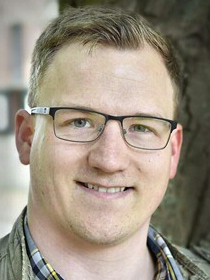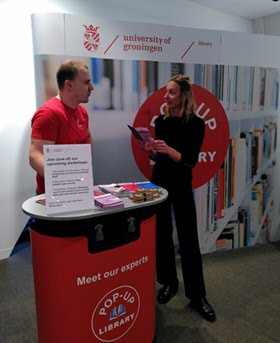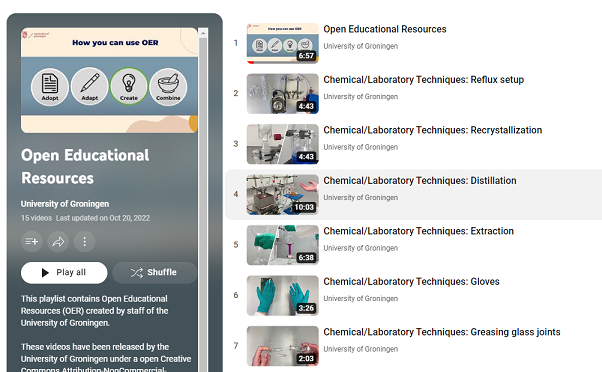Meet Martijn Blikmans, Open Educational Resources Specialist

"Open educational resources come in all shapes and sizes, and by starting small, you can often see that it is pretty easy to incorporate open elements in teaching."
It's been two years since the interview with open educational resources (OER) specialist Mira Zhuk. Meanwhile, a second OER specialist has joined the University of Groningen Library (UB): Meet Martijn Blikmans.
|
What are open educational resources (OER)? |
Why should teachers use OER?
There are many benefits to OER, but in my mind three of them stick out:
- OER are free of cost and copyright limitations. This makes OER easy to use. Also, you don’t have to worry that the book you use suddenly becomes unavailable because the publisher decides to pull access to some of their published resources in the middle of your course.
- OER save valuable preparation time and are of high quality. By reusing and remixing OER, you don’t have to spend valuable time organizing the basic elements of a course, such as literature lists, and you can be pretty sure materials you start from are of high quality if they are used in teaching by experts in their specific field.
- With OER, you can create innovative teaching settings. OER can be freely revised, restructured, and added to, so educators can adapt the materials to their and their students' teaching needs. You can also have students directly interact with and shape the materials, and let them create their own materials. Such active learning is more engaging and more rewarding for all parties involved.

Do you have suggestions for low-threshold steps to get started with OER?
OER come in all shapes and sizes, and by starting small, you can often see that it is pretty easy to incorporate open elements in teaching. You don't have to completely restructure a course in order to achieve more open education.
A simple first step is to use search engines for the images you use in lectures and presentations that offer open, Creative Commons licensed image results, such as Pixabay, Vecteezy, Pexels, The Noun Project, or OpenClipart.
Once you get the basics of adopting such smaller OER elements, you can start scaling up, looking for other open alternatives such as open articles or textbooks on websites like OpenStax or Open Textbook Library. You don’t immediately need to switch, but you can flag a few sections you would like to use for future iterations of your course.
And the easiest step of them all if you want to start with OER: email us at oer-library rug.nl. We are more than happy to explain the basics and help you get on track.
It's been two years since the interview with OER specialist Mira Zhuk. What has changed at the UG in this field?
The biggest change is the start of the UG Open Science Programme. Open education is one of the programme’s pillars. A team has been formed to promote and support the use of OER at the UG.
We have a broad agenda, tackling the incorporation of open education in UG policy together with experts from the Strategy Department of Education and Research. We’re creating and hosting workshops and microlabs together with Education Support and Innovation and the Teaching Academy Groningen. Our next workshop will be held on 6 December. Furthermore, we encourage open textbook publishing with the University of Groningen Press (UGP). Four teachers are already actively working on an interactive open textbook, with more to join soon. We have also updated our Library Guide on OER, and we are continuing our cooperation with SURF on the SURFSharekit and Edusources repository and search engine.
Pioneers
Of course, we have seen a fair number of teachers across the UG engage with OER, both with and without our help. At the Faculty of Spatial Sciences, for example, teachers are using (self-created) open textbooks in their teaching, with students giving invaluable feedback that form the basis for revised versions. At the Faculty of Science and Engineering, chemistry teachers have created instructional videos on laboratory techniques which are now available on YouTube.

It is very encouraging to see all these different pioneers that want to open up education. By the way, many teachers already spend a lot of time working with OER without being aware of this term, for instance when they try to assign only open access articles for their reading lists. I am also pleased to see that open education is becoming more visible in the open science sphere, with it being for instance a prominent part of the upcoming UG Open Research Award event on 17 November, and OER being prominently figured in national pushes for education reform (versnellingsplan, groeifonds).
What do you hope to achieve within the next two years?
My aim is to make the concepts of open education, OER, and open licenses clear to a large majority of UG staff. By simply only knowing what open education and OER are, and what it can potentially offer, we will already have set the stage for broader developments later on. I hope that such awareness will translate into more teachers opting to share their existing materials with the world under an open license. Ultimately, I think open education adoption will grow as an avalanche, rather than step-by-step: as long as we get enough initial movement going, the rest will surely follow.
More information
Contact
oer-library rug.nl
| Last modified: | 06 December 2023 12.07 p.m. |
More news
-
06 June 2025
India-Netherlands Hydrogen Valley Fellowship Programme announced
To coincide with World Environment Day, 5 June 2025, the Indian Department of Science and Technology and the University of Groningen yesterday announced a Hydrogen Valley Fellowship Programme Partnership, allowing talented Indian scholars working on...
-
24 March 2025
UG 28th in World's Most International Universities 2025 rankings
The University of Groningen has been ranked 28th in the World's Most International Universities 2025 by Times Higher Education. With this, the UG leaves behind institutions such as MIT and Harvard. The 28th place marks an increase of five places: in...
-
05 March 2025
Women in Science
The UG celebrates International Women’s Day with a special photo series: Women in Science.

